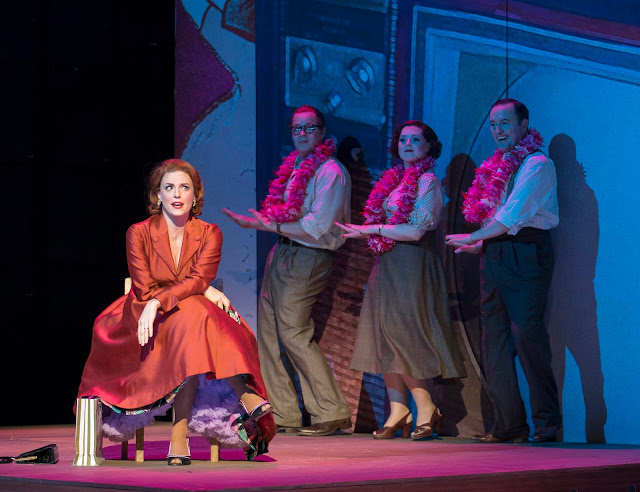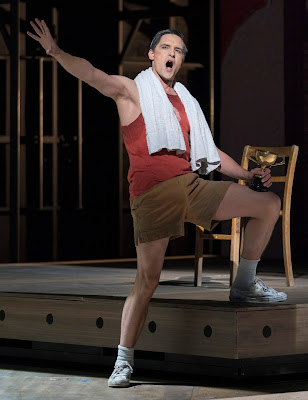 |
| Opera North’s production of Bernstein’s Trouble in Tahiti, Autumn 2017 Wallis Giunta as Dinah with Nicholas Butterfield, Fflur Wyn and Joseph Shovelton as the Trio (Photo Alastair Muir) |
Reviewed by Robert Hugill on Oct 21 2017 Star rating:
Light but not negligible; little gems by Bernstein and by Gilbert & Sullivan
 |
| Gilbert & Sullivan’s Trial by Jury, Amy Freston as The Plaintiff and Jeremy Peaker as The Learned Judge (Photo Robert Workman) |
Leonard Bernstein's Trouble in Tahiti was directed by Matthew Eberhardt and conducted by Tobias Ringborg, with Quirijn de Lang as Sam, Wallis Giunta as Dinah, Fflur Wyn, Joseph Shovelton and Nicholas Butterfield as the jazz trio, and Charlie Southby in the non-speaking role of Junior. Set design by Charles Edwards, costumes by Hannah Clark
Gilbert & Sullivan's Trial by jury was directed by John Savournin and conducted by Oliver Rundell with Richard Mosley-Evans as the Usher, Nicholas Watts as the Defendant (Edwin), Jeremy Peaker as the Learned Judge, Claire Pascoe as the Counsel for the Plaintiff, and Amy Freston as the Plaintiff (Angelina). Set design by Charles Edwards, costumes by Gabrielle Dalton. This was very much a showcase for the Opera North chorus, all the soloists are chorus members whilst the conductor, Oliver Rundell, is the chorus master.
Bernstein's Trouble in Tahiti dates from 1952, a fertile period for Bernstein with Wonderful Town (1953), Candide (1956) and West Side Story (1957). Notably, Trouble in Tahiti is opera (virtually sung through) not musical theatre, and Bernstein would not return to this form until the sequel, A Quiet Place in 1983.
 |
| Bernstein’s Trouble in Tahiti, Quirijn de Lang as Sam (Photo Alastair Muir) |
It is curiously down beat plot, enlivened by Bernstein's music. A little gem which provides a window onto the 1950s. Matthew Eberhardt's production used screens to move us between the jazz trio's radio studio and Sam and Dinah's house, huge adverts evoking 1950s suburban life, as well as Sam's gym and Dinah's trip to the movies.
Each gets a solo; Quirijn de Lang was amusingly macho in Sam's gym scene, all obsessed with winning, whilst Wallis Giunta's Dinah went for pure escapism with a ridiculous movie, Trouble in Tahiti. All the cast fitted neatly into the whole, creating a little gem which was both seductive and unsettling. Tobias Ringborg drew lively playing from the orchestra, though some of Bernstein' jazz-inspired riffs were allowed to get too lout for the voices.
Trial by Jury's plot is barmy whilst scoring a few neat points against the justice system. Yet Gilbert & Sullivan's operettas are complex machines which only work if you take the mechanism seriously, ever has fun been such as serious business. John Savournin understands G&S from the inside, as a singer as well as director. We could appreciate the neat efficiency of the way Savournin moved his cast around and enjoy the sheer verve of the performance. His production of Trial by Jury didn't try too hard to be anything else, it simply gave us a crisp, well ordered and neatly delivered performance. One that was really great fun!
The soloists, all members of the Opera North chorus all knew the importance of diction and crisp rhythm. Amy Freston made a delightful Angelina, though occasionally her voice would have benefited from a smaller venue and Nicholas Watts was suitably slick and spiv-like as Edwin. The judge, Jeremy Peaker, was a comic delight, demonstrating the role is about skill and comic timing rather than vocal beauty, whilst Claire Pascoe the counsel for the plaintiff, really knew how to put a G&S song over. Richard Mosley-Evans was the usher constantly struggling to keep order.
Savournin had moved the action to the 1930s, making Angelina an icon of the silver screen, and provided an opening monologue, aptly delivered by Amy J Payne (channelling Hyacinth Bucket), which explained the events so far in amusing fashion, underscored by more Sullivan.
Oliver Rundell directed the orchestra with crisp sympathy, ensuring the music was toe-tapping and bubbled along.
 |
| Opera North’s production of Gilbert & Sullivan’s Trial by Jury, Autumn 2017 Nicholas Watts as The Defendant with members of the Chorus of Opera North (Photo Robert Workman) |
The operas were fully captioned (not just summaries) and audio described, and around us there were a number of people taking advantage of both these facilities. In fact, the audience for the double bill was markedly different to the evening one, with many appearing to not be regular opera goers.
Opera North The Little Greats season, my reviews:
Leoncavallo & Mascagni, Bernstein, Gilbert & Sullivan, Janacek & Ravel
Elsewhere on this blog:
- Two little greats: Janacek's Osud and Ravel's L'enfant et les sortileges at Opera North - Opera review
- Not just a vanity project; Director Sophie Gilpin talks about HeadFirst Productions' Festival of Love, Sex and Death - interview
- Rising stars: Christophe Rousset directs Handel's Semele with OAE - opera review
- Lieder von Orient: Benjamin Appl & Graham Johnson at the Oxford Lieder Festival - concert review
- Fascinating links, fine performances: Brahms late idyll explored in day of recital and lectures at Oxford Lieder Festival - concert review
- Scarcely a problem: Tchaikovsky's Manfred Symphony from Semyon Bychkov & Czech Philharmonic - CD review
- Kill or cure: Pianist Julian Jacobson on his 70th birthday series - interview
- Visually flamobyant path to enlightenment: Mozart's The Magic Flute from the Metropolitan Opera - Opera review
- Engaging & colourful: Handel's Neun Deutsche Arien - CD review
- Jonas Kaufmann: Tenor for the Ages John Bridcut's new TV profile of the star tenor - tv programme review
- Historical context & fun: Lucy Worsley's Nights at the Opera - tv programme review
- Violin muse: I chat to violinist Madeleine Mitchell - interview
- Home




.webp)


.jpg)



No comments:
Post a Comment